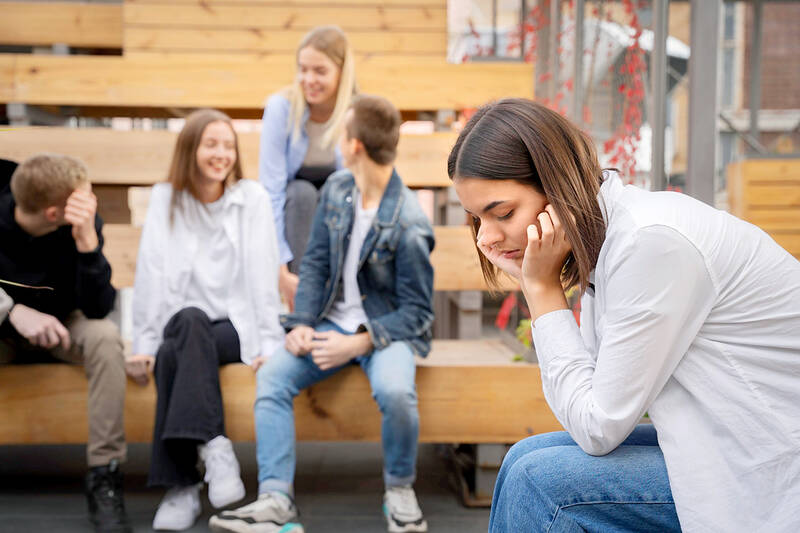Envision yourself at a lively social event. You’re engulfed by an intense sense of fear and discomfort as you scan the room, observing people mingling, giggling and enjoying themselves. This is the everyday reality for millions of people who live with “social phobia.”
Social phobia, also known as social anxiety disorder, is a mental illness. Typically, it manifests between ages 11 and 19, and is distinguished by an excessive and persistent dread of social situations. It’s important to realize that social phobia is a mental disorder that is far more serious than shyness, which is an inherent trait. Individuals with social phobia find it challenging to join in conversations, and they often overthink their words and actions in social situations to avoid embarrassment. Also, they’re overly concerned with how others perceive them and worry excessively about being judged negatively. In addition to these personality traits, physical symptoms, such as a rapid heartbeat, muscle tension, dizziness and sweating, may also occur in social situations.
The precise causes of social phobia remain unclear. However, research shows that past negative experiences can contribute to the development of social phobia. Experiencing public embarrassment, such as tripping and falling in front of a group of people, may lead to a fear of similar situations. Likewise, growing up with parents who were overly critical, protective, or who discouraged socializing and taking risks may also contribute to social phobia by inhibiting social skills and confidence. It’s important to note that not everyone who experiences these types of negative experiences will develop social phobia. Other factors, such as genetics and brain chemistry, also play a role in its development.

Photo courtesy of Unsplash / 照片:Unsplash 提供
If you have social phobia, effective treatment options, including medication and psychotherapy, are available. However, it’s important to seek help early. Remember, you don’t have to suffer alone, and there are effective ways to overcome social phobia.
想像你身處一個熱鬧的社交場合。當你掃視房間時,看到人們交談、咯咯地笑、享受歡樂時光,你會被一股強烈的恐懼和不安感所淹沒。這是數百萬患有「社交恐懼症」的人們每天都在經歷的現實。
社交恐懼症,也被稱為社交焦慮症,是一種心理疾病。通常,它出現在11到 19歲之間,其特點是對社交場合過度和持續的恐懼。重要的是要意識到,社交恐懼症是一種比害羞嚴重得多的心理疾病,害羞是種天生的個性特徵。患有社交恐懼症的人往往覺得參與對話是有難度的,他們經常過度思考自己在社交場合的言行,以避免尷尬。此外,他們過於關注別人對自己的看法,過度擔心受到負面評判。除了這些個性特徵外,如心跳加速、肌肉緊張、頭暈和出汗等這些身體症狀,也可能發生在社交場合。
社交恐懼症的確切原因尚不清楚。然而,研究顯示過去的負面經歷可能導致社交恐懼症的發展。經歷過公開的尷尬情境,例如在一群人面前絆倒,可能導致對類似情況的恐懼。同樣地,如果在成長過程中,父母過度批評、保護或不鼓勵社交和冒險,也可能由於抑制社交技巧和自信心而促成社交恐懼症的產生。重要的是要注意,並非所有體驗這類負面經歷的人都會患上社交恐懼症。其他因素,如遺傳學和大腦化學成分,也在其發展中起到作用。
如果你患有社交恐懼症,目前提供有效的治療選擇,包括藥物治療和心理治療。然而,重要的是及早尋求幫助。請記住,你不必獨自承受痛苦,並且有一些有效的方法可以克服社交恐懼症。
MORE INFORMATION
phobia n. 恐懼(症)
engulf vt. 吞噬;淹沒
mingle v. 交際;互相往來
overly adv. 過度地;極其
inhibit vt. 抑制;約束
psychotherapy n. 心理治療;精神療法
KEY VOCABULARY
1. envision vt. 設想;想像
Amy envisions a world in which everyone has access to clean water.
艾咪設想了一個人人都有乾淨的水源可用的世界。
2. discomfort n. 不適;不舒服
The hard and uncomfortable seats caused discomfort to the passengers on the long flight.
長途飛行時,堅硬又不舒適的座椅讓乘客們感到不適。
3. scan v. 審視;瀏覽;掃描
The teacher scanned the classroom to make sure all the students were paying attention.
那位老師掃視整間教室,確保所有學生都在專心聽課。
4. disorder n. 失調;混亂
Depression is a mental disorder characterized by feelings of sadness and hopelessness.
憂鬱症是一種心理疾病,其特徵為悲傷和絕望感。
5. inherent adj. 固有的;與生俱來的
There are inherent dangers in working with heavy machinery.
使用重型機械的工作存在固有的危險性。
6. trait n. 特徵;品質/personality trait 人格特質
Honesty is a valuable trait that builds trust in relationships.
誠實是在人際關係中建立信任的寶貴特質。
7. symptom n. 症狀;徵兆
Fever is a common symptom of the flu.
發燒是流感的常見症狀。
8. socialize v. 參與社交;交際
Children should socialize with others to develop their communication skills.
孩子們應該與他人社交,以發展他們的溝通技能。
9. genetics n. 遺傳學
Genetics plays a major role in determining an individual’s physical characteristics.
遺傳學在決定一個人的身體特徵方面扮演了重要的角色。
學習音檔: https://magazine.english4u.net/Magdata/menu/vvppq
《空中美語》雜誌APP免費下載: https://www.english4u.net/apps/index.aspx
免費收聽當月《空中美語》雜誌課文朗讀及解析 !
文章由AMC空中美語授權使用: https://www.english4u.net

A: Apart from the Taipei Music Center’s exhibit and concert, US pop rock band OneRepublic and rapper Doja Cat are touring Kaohsiung this weekend. B: OneRepublic is so popular that after tonight’s show at the K-Arena, they are set to return to Taiwan again in March next year. A: And Doja will also perform at the same venue on Sunday, right? B: Yup. Her collab with Blackpink’s Lisa and singer Raye for the song “Born Again” has been a huge worldwide success. A: Doja even made it on Time magazine’s “100 Most Influential People” list in 2023. She’s so cool. A: 本週末除了北流的特展和演唱會外,美國男團共和世代和饒舌歌手蜜桃貓朵佳也將來台開唱。 B: 共和世代因太受歡迎,繼今晚高雄巨蛋的演唱會後,預計明年3月即將再度來台巡演唷。 A: 朵佳本週日將在同場地開唱,對不對?

A: What show are you watching online? B: I’m watching “Fly Me to the Moon & Back” – an exhibition launched by the Taipei Music Center (TMC) to commemorate the late singer Tom Chang. A: Known for his sky-high notes, Chang is praised as one of the best singers in the 1990s. His death at the age of 31 was a major loss indeed. B: And I’m so glad that we went to the TMC’s 90s-themed concert last Friday. I finally saw the iconic “Godmother of Rock” WaWa perform live. A: This year-end show also featured singers Princess Ai, Bii, Wayne Huang, PoLin and

Just like fingerprints, your breathing patterns may serve as a definitive identifier. In a recent study, scientists have demonstrated an astonishing 96.8% accuracy in identifying individuals based on their respiratory patterns. This revelation could open up new possibilities in biometrics and personalized health monitoring. The notion of using individual breathing patterns as a distinct biological signature has long been a topic of discussion within the respiratory science community, yet a practical method for measurement remained elusive. This changed with the invention of a tiny, wearable device capable of extended recording. Researchers deployed a lightweight tube designed to fit inside

Continued from yesterday(延續自昨日) The study also uncovered a correlation between breathing patterns and mental well-being. Participants with higher scores on anxiety questionnaires exhibited shorter inhalation periods and more frequent breath pauses during sleep. “We intuitively assume that how depressed or anxious you are changes the way you breathe,” says one researcher involved in the study. “But it might be the other way around.” If this proves true, then training people to adjust their breathing may offer a novel approach to managing conditions like anxiety or depression. 該項研究也揭露了呼吸模式與心理健康之間的關聯。在焦慮問卷得分較高的受試者於睡眠期間表現出的吸氣時間較為短促、呼吸中止更為頻繁。一位參與研究的學者表示:「我們直覺地認為憂鬱或焦慮的程度會改變你的呼吸方式,但有可能是反過來的情況。」如果這一假設得到證實,那麼訓練人們調整呼吸的方式,可能會成為管理焦慮或憂鬱等疾病的新穎方法。 What Did You Learn? 1. What problem did scientists previously face when trying to measure breathing patterns? 2.